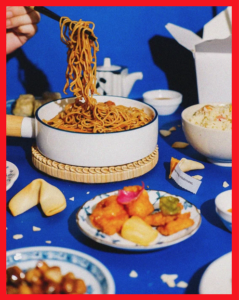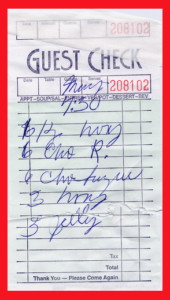Dealing with change is an ongoing issue for all of us. Understanding our own personal style of dealing with various stages of change—beginnings, middles, and endings—can be helpful. Comedian Jerry Seinfeld in his book, SeinLanguage, shares an insightful and humorous story called “Dining Out” that inspired me to come up with the following scenario.

This example will shine some light on how many of us unconsciously react to beginnings, middles, and endings.
~ : ~
First, imagine that we’re going to share a meal in a Chinese restaurant with a group of friends. Envision a scene where we are all in the restaurant gathered around a table. Get a sense of how hungry we all are. During this beginning stage of the meal, everyone pores over the menu, and there’s HIGH energy flowing as we consider what delicious dishes to order and share. With great delight, we negotiate and anticipate all the various flavors of the forthcoming meal. Lightness and laughter fill the air as we each think to ourselves—this will be the greatest meal ever!
Without a second thought, we order a round of drinks and exotic appetizers. A few minutes later, while sipping the drinks and nibbling the appetizers, we continue our progression into this middle stage of the dining experience. At this point, we jovially debate with our friends over which entrees look best. The waiter then takes our order, while we longingly gaze at the photographs of the various dishes featured in the menu.
Our eyes occasionally dart from the menu to the other waiters who are walking by with large trays of steaming aromatic plates of food. At this point we’re still sipping our drinks and crunching the appetizers; however, we can hardly wait until our entrees arrive!
Our energetic enthusiasm continues to escalate when our entrees arrive and we smell the incredible scents wafting across the table from each meticulously seasoned dish.
“Oh my—this is a feast!” one friend chortles with eyes wide.

Amidst a flurry of plate passing and stimulating conversation, we quickly devour the meal. Twenty or so minutes go by, and the inevitable happens…the meal comes to an end. At this point, the garnishes no longer appear elegant—they now look half-eaten or wilted.
During this ending stage of the meal, we slump back, loosen our belts, and let out exhausted sighs. With glazed eyes, we look at the napkins on the table, which are tattered and crumpled into stained paper balls. (And, as Seinfeld reminds us, in the “old days” we probably would have witnessed a cigarette butt lodged in the leftover rice.) Oi vey…
Not surprisingly, as we stare at the ravaged dishes before us, we don’t think we will ever eat again…and the thought of food is no longer even remotely attractive.
“Why did I eat that last egg roll?” someone bellyaches across the table (buyer’s remorse is beginning to set in).
“Whose crazy idea was it to order so many darn noodle dishes?” another person grumbles while shifting uncomfortably in his/her seat.
And then
we receive the…
~ DREADED CHECK ~
Through low muffled tones, we communicate our disbelief about the final amount of “the check” and alas—our perky and enthusiastic tones, which were rampant during the initial HIGH stages of the “dining experience,” are now…nowhere to be found.

We sheepishly pass the check around…and around…the table whispering, “Is this right?
How can this be?”
As we continue mumbling to one another, we finally agree upon how much tip to leave.
On that note, the curtain closes and the lights dim.
~ : ~
Can you relate to this exaggerated, but undeniably common, dining scenario? Clearly, our unconscious behaviors in everyday situations offer us many opportunities to giggle about how our humanness “shows up” in our lives. And, although giggling and humor are absolutely valid stress reducers, practicing mindfulness is an additional way that we can enhance our everyday health and wellbeing.
Living mindfully keeps us aware in each moment. We practice tuning in to life with every sense—seeing, hearing, smelling, tasting, and touching.
By contrast, the dining scenario example illustrates how, when we lack mindfulness, we may continually struggle with disappointments in our lives and miss out on simply being in the moment.
Did you notice how there was little mindfulness of “being in the moment” expressed during the example?
Even while they were sipping drinks and eating appetizers they were thinking about what entrees to order (watching other people’s dishes go by on platters) and fantasizing about how great their upcoming entrees were going to taste (future thinking). And during the ending of the meal, gratitude for the experience, or an appreciation for feeling full, wasn’t in the mix. Isn’t it amazing how much time many of us spend thinking about the future or the past—ironically missing this moment…now.
~ : ~
Let’s scale our dining example down for a moment and think about MINDFULNESS as it relates to drinking a cup of tea (we’ll start small). Imagine practicing staying fully present during the beginning, the middle, and the ending of the tea-drinking experience.
For example, we can practice staying present while heating the water and steeping the tea (beginning), drinking the tea (middle), and after the last sip, being mindful of how we’re feeling while placing the empty cup into its saucer (ending).
~ : ~
The opposite of mindfulness is being asleep in our lives. While tuned in to our minds (thoughts), we may be asleep when it comes to our bodily or emotional responses.
In this way, we often resist change or endings and notice feelings of disappointment after the tea is gone, rather than embracing a moment of GRATITUDE for the tea.
Meanwhile, if we focus only on our negative responses to the ending stage, then we miss enjoying the pleasurable warmth of the tea in our bellies.
Are you aware of your personal style when it comes to experiencing change in your life?
Practicing staying present—during beginnings, middles, and endings—helps us all consciously embrace change one moment at a time.
And as Jerry Seinfeld cleverly models, adding lightness and humor to the mix—is a wonderful stress buster. After all, since CHANGE is continual in life…HUMOR is a great teacher!


